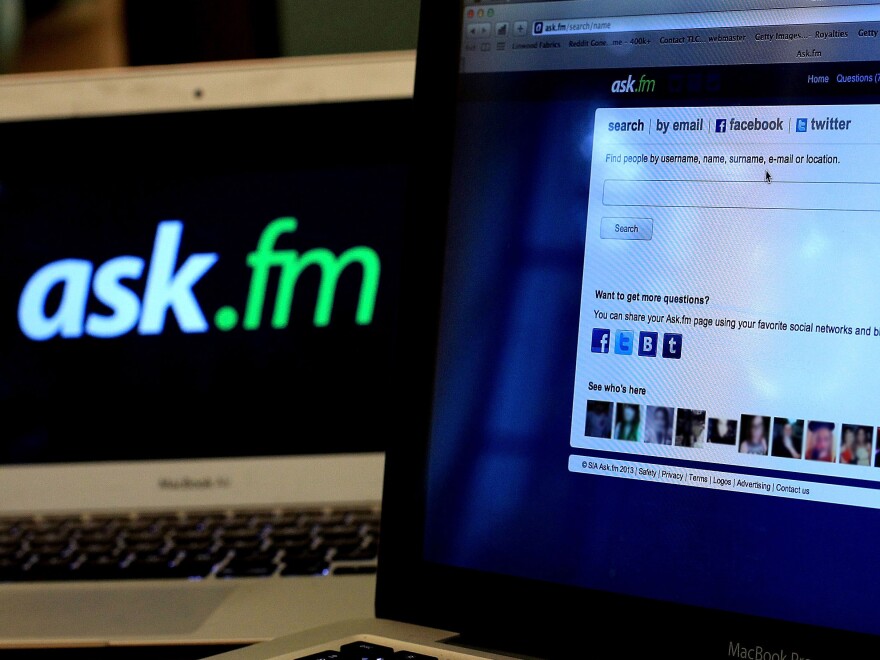This week on All Tech, we're exploring kids and technology with posts and radio pieces about raising digital natives. Look back at the stories and share your thoughts and ideas in the comments, by email or tweet.
The social media site Ask.fm has made headlines in connection with the suicide of a 12-year-old Florida girl who was the target of intense bullying on the site. Some law enforcement officials are warning parents about Ask.fm. But for parents, keeping track of the latest social network can be a game of Whac-a-Mole.
On Sept. 9, Rebecca Sedwick climbed a tower at an abandoned concrete plant near her Central Florida home and jumped. Shortly after her death, Sedwick's mother, Patricia Norman, told the local Fox news affiliate her daughter had been bullied on social media.
"People were sending her messages telling her that she should just go kill herself and everybody hated her and nobody liked her," Norman said.
Norman told the station that she moved her daughter to a new school and thought she'd gotten her off social media sites. But, without Norman's knowledge, her daughter found new sites — among them Ask.fm.
The European-based company lets teens post questions and answers anonymously. Mike Harris, who talks to kids in schools as part of his work with the district attorney's office in Jefferson County, Colo., says he's hearing complaints about Ask.fm, and not just from parents.
"The students are complaining, saying that this is a really bad site, a lot of bad people with ill intentions, and just very cruel people," Harris said.
The Jefferson County District Attorney's office just sent out a warning to parents about Ask.fm. It noted that several teen suicides in the past year happened after the kids were bullied on the site. In an email, Ask.fm told NPR it is responding with new features that make it easier to report and block abusive comments. Harris' advice is for parents to keep better track of where their kids go online.
"Grab those phones, the smartphones, see what apps your kids have. And there's a lot of iPhones that you can actually restrict them adding certain apps, or any app," Harris said.
But Devon Warner, the parent of a 15-year-old in San Francisco, says she found restricting what kids do online may not be the answer.
"I discovered that the child knew how to get beyond [the restrictions]," Warner said. Her son is transgender and has a mild form of Asperger's.
"When your child has a special need your heart's on your sleeve or it's in your throat," she said. When Warner realized she couldn't stop her son from going online, she chose a different way to protect him.
"My goal is to teach him how to buck himself up and how to look at the situation in a way where he can be at peace with other people," Warner said. "[Because] people are prejudiced and they're angry and they're cruel and there's all kinds of stuff. And I don't want him to think that's about him."
Warner's strategy seems to be working. I met her son — who goes by the name Warner — at a cafe near their home. He uses Facebook and Twitter, and he says he's also an editor on Wikipedia and has an Ask.fm account. He says he has occasionally been the target of bullies.

"I'm trying not to take it too personally, but sometimes I can't help but do," 'Warner' said. He tells me he's experienced more bullying from kids he knows in real school than online. And online, he often finds people and sites that help him feel better about being transgender.
"It's great to look at stuff that's actually supportive and has more of a positive attitude toward it," he said. "I spend a lot of time on the computer. Sometimes the computer's like one of the only friends I have."
Being on social networks is about connection with friends, says 18-year-old Jennalynn Sallings. When she was 14, she had a secret MySpace account. Sallings says she and her friends needed space away from the prying eyes of their parents.
"We need a sense of privacy. Everyone needs their sense of privacy and how else are we going to grow if we're feeling like we're locked up?" Sallings said. Her mother, Noelani Sallings, said she discovered her daughter's secret account and forced Jennalynn to show her everything. Sallings now regrets it.
"I personally should have given Jennalynn a little bit more room to experiment with what she was doing because I was so involved in school and other various aspects of her life," said Sallings. She says it's more important to talk to kids about how they use social media and about bullying in general. Her daughter agrees.
"Banning things from any teenager will just make them want it even more," Jennalynn said. "And just teaching them how to use things well and teaching them how to have that thick skin and understand that a lot of these people saying mean things have nothing better to do with their time."
Sallings says her generation is pretty inured to all the nastiness on the Internet. "We've all grown up with it, and it's like, we're used to seeing such obscene things that our sense of [obscenity] is less," she said.
Despite the rise of social media, the University of New Hampshire's Family Research Laboratory reports that teen suicides have trended down since the early 1990s.
After the death of her daughter, Florida mom Norman told local media simply that her message to parents was not to ignore their kids, Even if they seem fine, check up on them.
Copyright 2020 NPR. To see more, visit https://www.npr.org.


